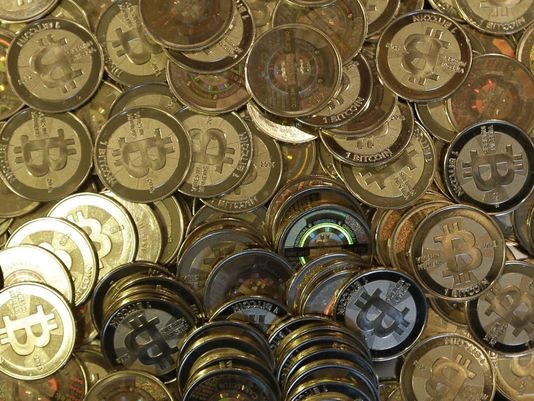
Bitcoin tokens in Sandy, Utah.(Photo: Rick Bowmer,AP)
Bitcoin gets a second chance from SecondMarket — and it may be just what the virtual currency needs to become a legitimate rival to major currencies.
SecondMarket, a New York company, plans to launch a regulated exchange to facilitate trading in Bitcoin, a digital currency some think could be a global form of monetary transfer. Given its successful track record, some say this small company with just 50 employees has the heft to push Bitcoin past recent major problems and make it a legitimate rival to major currencies, such as the U.S. dollar and stores of value like gold.
Giving investors a digital meeting place to buy and sell off-the-beaten-path securities is something SecondMarket has already done several times in its 10-year history. SecondMarket became a force on Wall Street by conducting trading in shares of Twitter and Facebook even before either company was publicly traded.
If SecondMarket can repeat its success bringing dark corners of financial markets into the light with Bitcoin, the currency could go from being a technological proof-of-concept to a real and stable global form of monetary exchange, proponents say.
"We think it (digital currency) is an undeniable trend," says David Kinitsky, senior director of SecondMarket, who is heading up the new venture, which will be spun out of SecondMarket and given a new name. "From the big banks to the big corporations and banks, everyone seems to recognize the possibility that Bitcoin, or something like it, is here to stay."
SecondMarket's move comes just after Bitcoin suffered yet another reputational hit. On Monday Mt. Gox, one of the biggest marketplaces for Bitcoin transactions based in Tokyo, closed its doors causing an estimated 744,000 Bitcoins valued at $400 million to vanish.
The move by SecondMarket lends much-needed credibility to Bitcoin, which has been the currency of choice for international illegal activities often exchanged in shady person-to-person transactions. "SecondMarket is proving that some firms run into the fire and see opportunity where others see danger," says Mark Williams, professor of finance at Boston University. "However, SecondMarket is a vast improvement over the likes of Mt. Gox."
SecondMarket traces its roots to 2004 when it was created by Barry Silbert as a way to bring electronic and efficient trading to financial securities that lacked a liquid market. Silbert, CEO of SecondMarket, was an investment banker at boutique investment banking firm Houlihan Lokey Howard & Zukin earlier in his career. At Houlihan, Silbert worked on structuring mergers and acquisitions. Silbert also knows his way around Wall Street, in that he worked at Bear Stearns, Smith Barney and Rydex Funds.
SecondMarket, originally called Restricted Stock Partners, started out by allowing investors with stock that's not available to be sold on an exchange such as the New York Stock Exchange, to sell in private deals. But SecondMarket's reputation took off around 2008 when it launched a number of new platforms to allow trading of shares of private companies many thought were poised an initial public offerings.
Employees of companies such as Facebook and Twitter, for instance, normally would have to sit on their shares of the company, wait for the IPO and then hopefully sell for a profit. This process could take years, and if the IPO never happened, employees would be left holding worthless stock. But these employees could instead get their money earlier by posting their shares on SecondMarket and selling to investors who were more patient or could tolerate more risk. SecondMarket also launched a marketplace that allowed investors, locked into complicated bond-like instruments called auction rate securities, to sell them.
SecondMarket works with regulators to create markets for securities that were previously untradeable. And it's the company's willingness to play by the rules plus its relationships with the big banks and investment banks that have some thinking its involvement could be the credibility Bitcoin needs. "You have to have rules. When people don't follow rules, you get Bitcoin disasters," says Joe Saluzzi, trader at Themis Trading. SecondMarket has dabbled with Bitcoin before. The company already operates a fund that owns Bitcoins that investors can buy into. SecondMarket also operates a Bitcoin trading desk.
The company is registered with the Securities and Exchange Commission as well as the industry regulator Finra. The company does not currently have any disclosure events of criminal matters, regulatory actions or civil judicial proceedings against it, according to its Finra filing.
SecondMarket could address one of the biggest knocks against Bitcoin: volatility. One of the goals of currency is to be somewhat stable. And by that definition, Bitcoin has been a disaster. The price of Bitcoin went from $884 per U.S. dollar on Jan. 24, 2013, falling to $298.73 on Feb. 21, according to currency value trader Oanda.
SecondMarket's system would need to win the comfort of large banks and financial institutions in order to bring the trading size and scale to reduce Bitcoin's breathtaking volatility, says Richard Levin of law firm Baker Hostetler, who previously worked at SecondMarket.
The marketplace also needs to have security that gives big players confidence in the system. Already, large investment banks are showing more interest in Bitcoin and are releasing research reports on the currency, Levin says.
SecondMarket will also need to answer the biggest question mark over how the currency and exchange would be regulated, a critical issue that needs to be resolved before digital currencies can catch on, Levin says. It's unclear whether the Commodity Futures Trading Commission or the Securities and Exchange Commission, or both, would oversee the Bitcoin trading, Levin says.
If the big market players and the regulators are aligned, as has been done with other markets, Bitcoin could see the same rapid growth that online stock trading saw in the late 1990s, Levin says. "When you have legitimate players in the financial industry providing liquidity, maintaining prices and a degree of regulation, it creates confidence in the system," he says.
Source: USA TODAY
Annex News - Business



